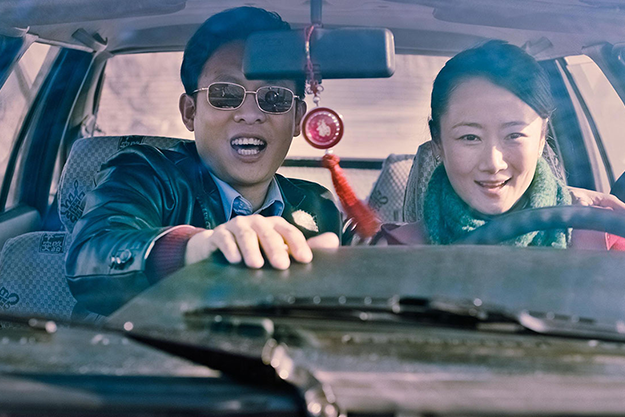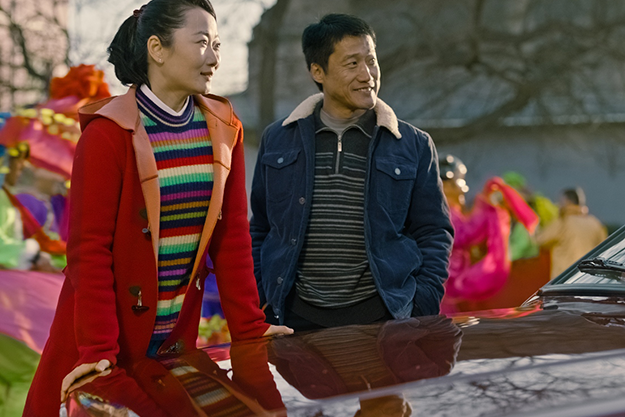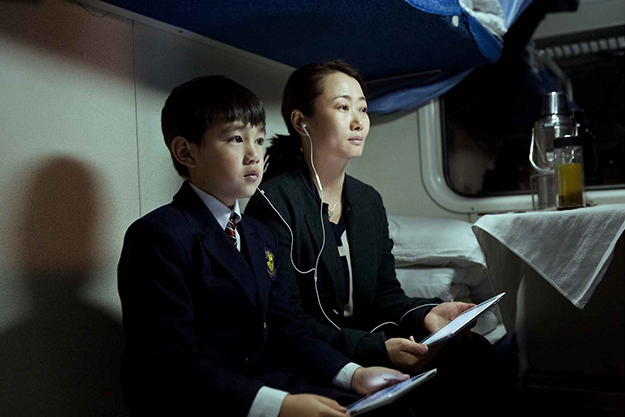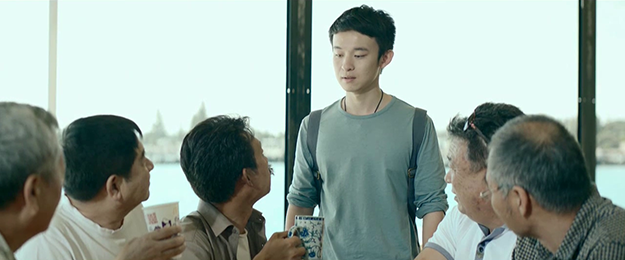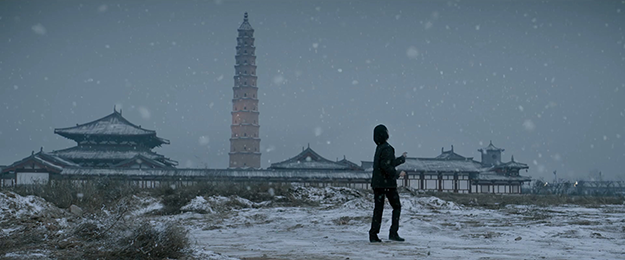If Jia Zhang-ke’s latest feature was one of 2015’s biggest disappointments, it’s simply because two-thirds of it are so good, making the misjudged final chapter all the more bathetic. Because of that, it’s hard to properly assess the first two sections of Mountains May Depart. You can see how much they promise, but without the context of a final successful whole, you can’t be sure how far they succeed. Still, you take what satisfaction you get—which is not inconsiderable—and you have at least to applaud Jia’s ambition to try something new, even if it leaves him flailing in inhospitable waters. Jia’s features have felt like individual chapters in a continuous narrative, mapping change in Chinese society for the best part of two decades since his debut feature Xiao Wu in 1997. If that seems a very long time ago, given the pace of change in China this century, the feeling is confirmed by Mountains May Depart, which begins its story only two years later. The film’s message is that China has traveled a long way since the turn of the century—but Jia seems to conclude by wondering how far it has left to go, and whether the nation might be heading toward a dead end of sorts. What I most appreciated about Mountains when I saw it in Cannes last year is that it is so full of surprises—which, be warned, I’m about to spoil for you. It’s a fact of cinema that the element of absolute surprise on which so many movies depend generally only exists for a brief moment when a film makes its festival premiere: after its first reviews, publicity, social media exposure, and the rest, it becomes pretty much a known quantity before most people get to see it. Mountains, more than most films, benefits from being—to paraphrase an earlier Jia title—an unknown pleasure.
The drama begins in 1999 in the city of Fenyang, where we meet three young people about to enter the new century. Tao, played by the director’s wife and regular star Zhao Tao, is a schoolteacher, first seen in the opening shot taking part in a group exercise class to the Pet Shop Boys’ “Go West” (OK, an ominous touch of obviousness—but still a nicely boisterous start). Amid Fenyang’s New Year celebrations, we meet Tao’s two longtime friends and admirers. Liangzi (Liang Jin Dong) is an unassuming, good-natured worker at a local mine. He and Tao enjoy a natural intimacy, enough for them to cheerfully slurp dumplings from the same bowl—to the disgust of Tao’s other suitor. This is Jinsheng (Zhang Yi), addressed by some as “Boss Zhang”—a bullish leather-jacketed capitalist, exulting in his acquisition of a shiny new Volkswagen. With a gas station already in his portfolio, he announces that he’s just bought the mine for a pittance. He offers Liangzi a choice promotion, but at a price: he has to keep away from Tao. It’s a flaw in the film’s execution that, given how brazenly obnoxious and petulant Jinsheng is, Tao nevertheless chooses him over Liangzi. No doubt the logic of the drama is that even so manifestly authentic and level-headed a woman can be won over by the promise of wealth and status, by the glitter of the capitalist future. But Jia never quite convinces us of this: Zhang Yi is relishably abrasive as Fenyang’s cock of the walk, but what the character surely needs is a plausible dash of seductive movie-star charm, and we don’t get that. In fact, Jinsheng veers ever more towards caricature. Before he and Tao marry, they pose for a wedding photo in front of a backdrop of the Sydney Opera House. Even then, he can’t resist getting out his mobile, exulting: “My phone brings good news! Coal’s gone up again!” Soon after, we see the birth of a son, whom Jinsheng insists on naming Zhang Dollar—“Daddy will make you lots of dollars!” he crows.
At times, Mountains is wince-inducingly on-the-nose. There’s also a moment in Part One that I found entirely mysterious, a sudden plane crash that comes out of nowhere, and that is never commented on; perhaps a memento mori, but if so, as incongruous-seeming here as the stretched skull is in Holbein’s Ambassadors. But this is by nature a film of broad strokes—a melodrama in the grand manner, about the passing of time, the waning of love, the enduring tensions of a triangle, all against a socio-economic backdrop. It is, in effect, Jia’s own Written on the Wind or Giant. However, that only fully becomes apparent with the film’s first big surprise: its opening credits, which come a full 47 minutes in. This is also where the frame widens out from Academy ratio, as the action jumps to 2014. We rejoin Liangzi, now married with a child in another town, having long ago left Fenyang, but he’s seriously ill, and it’s time for him to return home. Before he does (more grounds for wincing), we see him in front of a cage at the zoo containing a restless tiger. Back in Fenyang, Tao is a wealthy local celebrity, but living alone; she and Jinsheng are divorced, and he’s taken Dollar with him to Australia. When Tao’s father dies, Dollar flies home to join her, and the boy is totally westernized: he wears a school tie and blazer and what looks like a Hermès scarf, doesn’t know how to behave at a Chinese funeral, and can’t even address Tao “Ma” properly, hesitantly calling her the English “Mummy.” Meanwhile, his iPad shows photos of him on a pony, on a yacht, and at a luxury car showroom—about the crudest possible signifiers of his corruption by Western values (all that’s missing is a shot of the kid chugging Cristal with Miley Cyrus). Despite all this, and partly because of Zhao Tao’s finely nuanced performance, there’s great poignancy in the depiction of the distance between mother and son—especially in the scene where she plays him a ’90s Cantonese pop ballad, a record that Jinsheng once gave her.
The next surprise is not so satisfying: a jump to 2025, as the frame expands further into widescreen. This final section centers on Dollar’s life in Australia. Played as a teenager by Dong Zijian, Dollar is part of a second generation of immigrant Chinese youth who are so estranged from their roots that they have to have Chinese names explained to them by their teacher Mia (veteran Taiwanese-born star Sylvia Chang). Dollar is deeply screwed up, and can barely remember his mother—so it’s not surprising that, increasingly drawn to Mia as a surrogate, he ends up having an uncomfortably Oedipal relationship with her. As for Jinsheng, he’s become an embittered recluse in a luxury apartment filled with guns; one of this section’s pithier moments has him comment on Australia’s liberal new weapons laws (“I can now own a pile of guns, but no one to fire them at . . . Freedom is bullshit!”). There are various reasons why this third section doesn’t work. One is Dong Zijian’s self-conscious acting, which never quite chimes with Sylvia Chang’s serious, nicely judged tenderness as Mia. Another is that there are so many inconsistencies. Although he’s been in Australia for over 11 years, and has forgotten his Mandarin, Dollar doesn’t have any trace of an Australian accent (nor do his peers); but, as spoken by Dong, his English doesn’t seem that fluent either. And his arch-westernizer dad still can’t speak English (so how have they been communicating for all this time?). There’s also a painfully stiff scene between Mia and her robotically acted Australian ex-husband—the only Oz accent heard in the entire film. Nor does this final section convince you that it’s taking part in the future. All we really learn about 2025 is that iPads are now transparent and that the world economy has shifted in ways we might expect (our young hero’s classmate jokes, “The dollar’s been in free fall for years—they should have called you Renminbi!”). And bizarrely, old-fashioned travel agents appear to be back in business. Not that Jia is that interested in superficial futurism, and why should he be? But he seems a little dazed stepping out of a time and a place he knows, and ill at ease with the English language, with the dialogue taking a really clunky turn (“The hardest thing about love is caring. I guess we have to feel the pain to know we’re in love”).
There’s certainly stylistic and formal audacity in Mountains, not least in the cinematography of Jia’s perennial accomplice Yu Lik Wai, from the hotly colored roughness of the first part’s late-’90s digital look, to the sleekly antiseptic final section, steeped in cold white daylight. All credit to Jia for taking risks, but he stepped outside his safety zone far more effectively in his last film A Touch of Sin, where his social observations (including some considerably sharper jabs at nouveau riche corruption) were couched in the complex framework of a series of interlinked crime stories. The Sirkian aspect of Mountains allows you to accept some of the broader strokes, and the dramas are knitted together effectively by recurring motifs: the Cantonese song, the bright red wedding invitation still sitting unopened at Liangzi’s old home after 14 years, and the multi-colored jumper Tao wears in part one. This garment later turns up as a coat for her pet Labrador, presented to her as a puppy by Jinsheng (“How long will the dog live? We’ll be turning 40 when it dies,” he muses with near-sociopathic lack of sentiment). However buoyant the Chinese economy may be in 2025, the closing shots of Tao against a gloomy hometown horizon (to a reprise of, what else, “Go West”) suggest that in other ways the future China’s glory days are over, as if the rush to capitalism has left the nation empty, or a neglected mother like Tao. It’s a powerful ending for a film that so catastrophically veers off the rails just before that—and it’s perhaps Jia’s way of saying that Chinese filmmakers shouldn’t be taken in by the glamour of the West and the glitter of futurism. After all, if an astute solidly grounded realist like him can come so badly undone… Jonathan Romney is a contributing editor to FILM COMMENT and writes its Film of the Week column. He is a member of the London Film Critics Circle.
